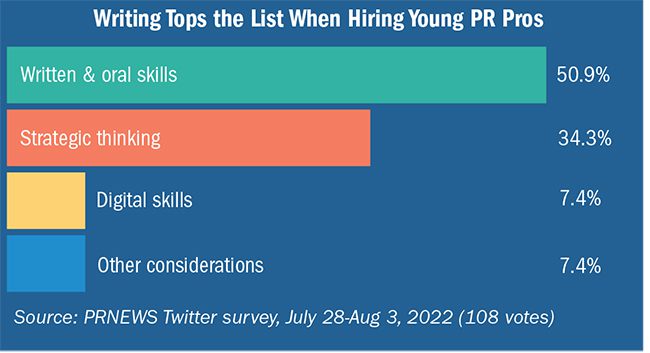
Each year in August we write a PR education/back-to-school story. Our goal is discovering whether or not the academy's curriculum is in sync with PR's needs. In previous years, we've found general agreement that it is. Again, this year, consensus of academics and PR pros is that written and oral communication are the most critical skills for young PR candidates [please see chart].

However, there was disagreement in one key area, writing length.
The professors stress short-form writing, almost to the exclusion of long-form work.
On the other hand, PR pros we spoke with say long-form writing remains important.
Making things more opaque is that some of the PR pros included here also teach college courses.
Long vs short
"With digital aspects ingrained in this generation...we find benefits in [candidates having skills in] long-form writing," says Kelly Williamson, N. America president at APCO Worldwide. Williamson is an adjunct professor at UNC-Chapel Hill.
Similarly, Kristin Knihnicki, SVP, talent acquisition lead, Americas, FleishmanHillard, says, "writing is still the most important hard skill...and it's very important that you not only enjoy writing and working on it, but that you understand that within PR there's still lots of long-form writing."
Like Williamson, Knihnicki assumes young candidates' digital prowess signals they arrive "with an understanding of how to write for social and [create] shorter content, which is great. But we still put a lot of emphasis on how important it is to also be interested in doing longer forms of writing."
Short-form and getting a job
Yet our full-time professors defend the importance of short-form writing. "Members of the English department look at [PR professors] cross-eyed when we say this, but the days of long-form, in-depth writing, at least in a professional [PR and marketing] environment, are gone," says Chuck Byers, professor, Santa Clara University.
He adds, "we must, for lack of a better term, focus on teaching students to write in 30-second sound bites. That's the new end-user demand."
In his classes, Byers offers a balanced view. "I tell students it's important...that they are able to write 50-page, academic term papers...now, though, 'We're going to teach you another way to write. One that'll get you a job.'"
Our academics agree the qualities of good writing transcend length. "You want mastery of writing in general, of course,"says LaShonda Eaddy, assistant professor, Penn State. "But when [an employer] is asking you to write in 50 characters or fewer, [she] still wants the message to be impactful and meaningful."
Characteristics of good writing, long or short, that our academic sources mention include:
- clear thought and logical organization
- short, declarative sentences
- active voice
- proper grammar/spelling and
- jargon-free prose
Owned content and objectivity
As writing remains paramount, we looked at related issues. For example, Byers sees content development, particularly in owned content, that needs help. "Nobody wants to read in great detail how wonderful you or your company is," Byers says.
Instead, students, and by extension, PR pros, should emphasize how a company, its products and people, can help solve customers' problems, Byers says.
"We have to go back to news writing 101 and understand that unless we bring more objectivity and facts and less editorializing to owned content, we're literally throwing bad money after good. And probably doing the brand more harm than good."
However, he admits marketing VPs are unlikely to accept this viewpoint.
Critical thinking and writing
Eaddy takes issue with our survey results, arguing strategic thinking is as important for the young PR pro as good writing. Moreover, she thinks the two are interrelated. "If someone doesn't listen well or read effectively and absorb important points, their writing will be ineffective, whether it's long- or short-form" she says.
As such, an assignment in one of her classes has students summarizing the 3-4 most important points from their reading material each week. Finding the most vital bits in several articles is a challenge, Eaddy believes, but it's something PR pros must do constantly.
"If I was your boss and I didn't have time to read all of the material, you have to let me know what's most important. You have to demonstrate mastery of what you read. That takes critical thinking and a strategic mindset...we can all summarize a chapter. That's not what you need in PR."
Strategic view
Instead, she argues, PR pros must think several steps ahead and across the enterprise.
"'Hey, I see we're doing this and I know why. But should we possibly consider A, B, or C in light of inflation? Does this support our goals and strategies?'"
In addition, "a strategic mind is able to articulate plans across functional areas, so you can get buy-in."
Byers concurs with Eaddy's points about the importance of critical and strategic thinking and listening. Like Eaddy, he eschews teaching students what to think in favor of how to think.
As such, PR and marketing professionals from Silicon Valley work with his students during classes, discussing real-world issues. "We ask [students] to interact with that second voice... literally use deductive reasoning...include it as strategic elements in their [assigned] projects."
Inclusive writing
Jim Joseph, the newly minted global chief marketing and integration officer at Ketchum, sidesteps the length issue of writing. Instead, he emphasizes students "identify human insights" while writing during classes he teaches at NYU. "I am constantly asking the students to analyze and write out the emotional connection that they are observing," he says. Lacking an emotional and empathetic component, Joseph argues, PR content is "futile."
He says the last few years have "definitely changed how we find human insights and how we write about them." Communicators "need to be much more inclusive" and empathetic "in our work across all audiences," Joseph argues.
Beyond writing
Of course, there are myriad considerations when companies recruit and hire young communicators. Sometimes these are things college courses aren't designed to address. Still, conscientious faculty insert them when possible.
Examples include Eaddy's written assignments that mimic briefs for the boss. Joseph does his best to "portray real-world examples, give real-world assignments and study real-world situations, so that the classroom can simulate the workplace as much as possible."
Another thing Eaddy and Byers mention is how they try to impart confidence in their students. They believe issues management, including DEI and ESG, will become big factors for PR pros. As such, they'll need self-confidence to learn about these disparate subjects and advise executives about them.
Collaboration and other intangibles
In addition, Byers emphasizes collaboration in his classes, assigning group projects. "Silicon Valley managers repeatedly tell me the ability to collaborate is missing from too many candidates," he says.
Indeed, the PR pros look at both hard skills and intangibles. "We value individuals who go beyond the foundational skills required for business and display a hunger to learn outside of assigned tasks," APCO's Williamson says.
"We admire those who have a balance of IQ and EQ and strong interpersonal skills, virtually and in-person." These are people, she says, who can "engage audiences authentically...and will "develop genuine relationships...[and] a caring for our business."
Similarly, though FleishmanHillard's Knihnicki is seeking candidates with a college degree and internship experience, she's "reading between the lines," seeking potential.
"If a candidate can accurately articulate and tell a compelling story about why they want to get into communication, why they want to go to agency and why Fleishman, that's gonna get them through the door versus having a beautiful pedigree."
Indeed, she emphasizes that "we look at diverse backgrounds of all kinds" and consider candidates without "a traditional background.
